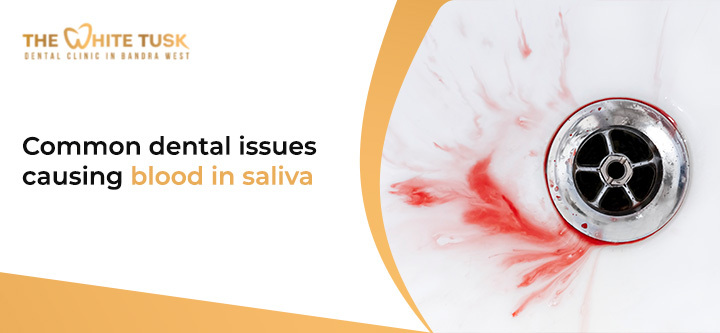
Blood in saliva can be an alarming sight, often causing panic and concern among individuals who notice it. While it can be a symptom of various conditions, ranging from minor to severe, it is essential to understand that it is not always a cause for immediate alarm. In this blog, we will explore the common dental issues that can lead to blood in saliva, ensuring that you are well-informed and prepared to seek appropriate care when necessary.
Understanding blood in saliva before discussing specific dental problems is important. Hemoptysis is the term used in medicine to describe coughing up blood from the respiratory tract. On the other hand, blood in saliva usually refers to bleeding from the mouth, which can come from the gums, teeth, or other oral tissues.
Gum disease is one of the most common reasons for blood in saliva. It begins with gingivitis, which is characterized by inflammation of the gums due to plaque buildup. If left untreated, gingivitis can progress to periodontitis, a more severe form of gum disease that can lead to tooth loss and other health issues. Symptoms include bleeding gums while brushing or flossing, red or swollen gums, and persistent bad breath.
Aggressive brushing or flossing can cause micro-tears in the gum tissue, leading to blood in saliva. It is essential to use proper brushing and flossing techniques to maintain oral health without causing harm.
Oral thrush can be caused by an overgrowth of Candida albicans, which leads to a fungal infection. It can cause soreness, redness, and bleeding in the mouth, which may result in blood-tinged saliva.
Canker sores, cold sores, and other mouth ulcers can bleed when irritated, leading to blood in saliva. These sores can be painful and may require medical treatment to heal properly.
After dental procedures such as tooth extractions, it is common to experience some bleeding, which can mix with saliva. This bleeding is typically temporary and should subside within a few hours or days.
Leukoplakia is a condition characterized by white patches in the mouth that can become thick and bleed easily, contributing to blood in saliva. It is often associated with tobacco use and can be a precursor to oral cancer.
Oral cancer can cause bleeding and ulcers in the mouth, which may lead to blood in saliva. Early detection is crucial for successful treatment, so it’s important to recognize other symptoms such as persistent lumps, difficulty swallowing, and changes in the voice.
Preventing blood in saliva often involves maintaining good oral hygiene practices, including regular brushing, flossing, and dental check-ups. These simple yet effective habits can help keep your mouth healthy and reduce the risk of conditions that may lead to bleeding. Here are some detailed and additional tips for prevention and treatment:
Remember to brush your teeth regularly, at least twice daily, using a soft-bristled toothbrush and fluoride toothpaste. Use gentle, circular motions and hold the toothbrush at a 45-degree angle to the gums to avoid damaging them. Change your toothbrush every three to four months or earlier if the bristles look worn out.
Remember to floss daily to eliminate plaque and food particles between your teeth and along the gumline. Use a gentle sawing motion to slide the floss between your teeth without snapping it against the gums. If traditional flossing is difficult, consider using interdental brushes or water flossers.
Regular dental check-ups and professional cleanings are necessary. The frequency may vary depending on your oral health needs, but most people benefit from visits every six months. During these visits, your dentist can identify and treat early signs of gum disease or other issues that may cause bleeding.
Maintain a balanced diet rich in fruits, vegetables, and fiber, which can support gum health. Limit sugary and acidic foods and beverages that can contribute to tooth decay and gum inflammation.
If you use tobacco products, consider quitting. Smoking and chewing tobacco can significantly increase the risk of gum disease and oral cancer.
Drink plenty of water throughout the day to help cleanse your mouth and promote saliva production, which can aid in washing away food particles and bacteria.
If you notice blood in your saliva, it’s important to consult with a dentist or healthcare professional to determine the underlying cause and appropriate treatment. Here are some steps you might expect during the treatment process:
Your dentist will conduct a thorough examination of your mouth, including the gums, teeth, and oral tissues. They may take X-rays or perform other diagnostic tests to identify the source of the bleeding.
Based on the diagnosis, your dentist will recommend a treatment plan. This could include deep cleaning for gum disease, medication for infections, or more specialized treatments for conditions like oral cancer.
If gum disease is present, your dentist may recommend scaling and root planing, which are deep-cleaning procedures to remove plaque and tartar from below the gumline.
In some cases, antibiotics or antifungal medications may be prescribed to treat infections that are causing the bleeding.
Your dentist may advise you to make certain lifestyle changes, such as quitting smoking or adjusting your diet, to support your oral health.
Regular follow-up appointments are essential to monitor your condition and ensure that the treatment is effective.
If the bleeding is severe or accompanied by other serious symptoms, seek emergency dental care or go to the nearest emergency room.
Remember, early intervention is key to managing dental issues effectively. By maintaining good oral hygiene and seeking professional care when needed, you can minimize the occurrence of blood in saliva and address any potential health concerns promptly.
Blood in saliva can be a symptom of various dental issues, ranging from minor to severe. By understanding the common causes and taking proactive steps to maintain oral health, individuals can minimize the occurrence of blood in saliva and address any potential health concerns promptly. Remember, early intervention is key to managing dental issues effectively, so never hesitate to seek professional advice when needed.